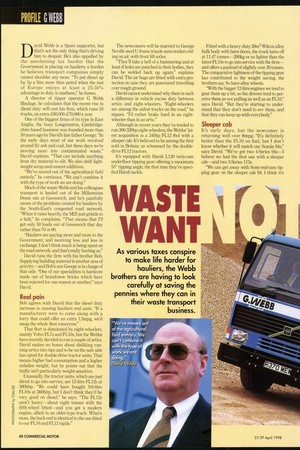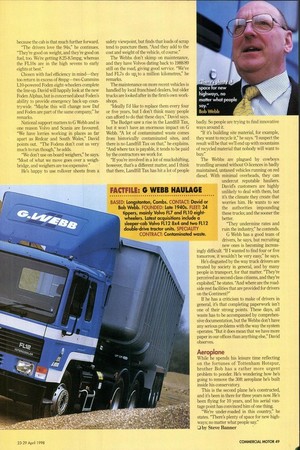WAST NT As various taxes conspire to make life harder
Page 44

Page 45

If you've noticed an error in this article please click here to report it so we can fix it.
for hauliers, the Webb brothers are having to look carefully at saving the pennies where they can in their waste transport business. FACTFILE: G WEBB HAULAGE BASED: Longstanton, Cambs. CONTACT: David or Bob Webb. FOUNDED: Late 1940s. ' 24 tippers, mainly Volvo F17 and FL10 eightwheelers. Latest acquisitions include a sleeper-cab Volvo F1.12 8x4 and two FL12 double-drive tractor units. SPECIALITY CONTRACT: Contaminated waste. David Webb is a Spurs supporter, but that's not the only thing that's driving him to despair. He's also appalled by the unrelenting tax burden that the Government is placing on hauliers; a burden he believes transport companies simply cannot shoulder any more. "To put diesel up by lp a litre more than petrol when the rest of Europe enjoys at least a 25-50% advantage in duty is madness," he fumes.
A director of tipper operator G Webb Haulage, he calculates that the recent rise in diesel duty will cost his firm, which runs 24 trucks, an extra L60,000-£70,000 a year.
One of the biggest firms of its type in East Anglia, the busy Longstanton, Cambridgeshire-based business was founded more than 50 years ago by David's late father George. "In the early days most of our work revolved around fly ash and coal, but these days we're moving more into contaminated waste," David explains. "That can include anything from dry material to silt. We also shift lightweight scrap and cement additives.
"We've moved out of the agricultural field entirely," he continues. "We can't combine it with the type of work we are doing."
Much of the waste Webb and his colleagues transport is hauled out of the Millennium Dome site at Greenwich, and he's painfully aware of the problems created for hauliers by the South-East's congested road network. "When it rains heavily, the M25 just grinds to a halt," he complains. "That means that I'll get only 50 loads out of Greenwich that day rather than 70 or 80.
"Hauliers are paying more and more to the Government, and receiving less and less in exchange. I don't think much is being spent on the road network, and that's really hurting us."
David runs the firm with his brother Bob. Supplying building material is another area of activity—and Bob's son George is in charge of that side. "One of our specialities is hardcore made out of brand-new bricks which have been rejected for one reason or another," says David.
Real pain Bob agrees with David that the diesel duty increase is causing hauliers real pain. "If a manufacturer were to come along with a lorry that could offer an extra 1.5mpg, we'd swap the whole fleet tomorrow."
That fleet is dominated by eight-wheelers, mainly Volvo FL7s and FL1Os, but the Webbs have recently decided to run a couple of artics. David makes no bones about disliking running artics into tips and to be on the safe side has opted for double-drive tractor units. That means higher fuel consumption and a higher unladen weight, but he points out that the traffic isn't particularly weight-sensitive.
Unusually, the tractor units, which are just about to go into service, are 12-litre FL12s at 380bhp. "We could have bought 9.6-litre FL1Os at 360bhp, but I don't think they'd be very good on diesel," he says. "The FL12s aren't heavy—about eight tonnes with the fifth-wheel fitted—and you get a modern engine, albeit in an older-type truck. What's more, the back end is identical to the one fitted to our FLIO and FL12 rigids." The newcomers will be married to George Neville steel U-frame triaxle semi-trailers riding on air, with front lift-axles.
"They'll take a hell of a hammering and at least if holes are punched in their bodies, they can be welded back up again," explains David. The air bags are fitted with extra protection in case they are punctured travelling over rough ground.
David cannot understand why there is such a difference in vehicle excise duty between artics and eight-wheelers. "Eight-wheelers are among the safest trucks on the road," he argues. "I'd rather brake hard in an eightwheeler than in an artic."
Although in recent years they've tended to run 300-320hp eight-wheelers, the Webbs' latest acquisition is a 340hp FL12 8x4 with a sleeper cab. It's believed to be among the first sold in Britain; as witnessed by the doubledrive FL12 tractors.
It's equipped with Harsh L120 twin-ram underfloor tipping gear offering a maximum 550 tipping angle; the first time they've specified Harsh tackle. Fitted with a heavy-duty 28m3 Wilcox alloy bulk body with barn doors, the truck tares off at 11.47 tonnes-200kg or so lighter than the latest FL1Os to go into service with the firm— and offers a payload of slightly over 20 tonnes. The comparative lightness of the tipping gear has contributed to the weight saving, the brothers say. So have alloy wheels.
"With the bigger 12-litre engines we tend to gear them up a bit, so the drivers tend to perceive them as not pulling as well as an FL10," says David. "But they're starting to understand that they don't need to rev them, and that they can keep up with everybody."
Sleeper cab It's early days, but the newcomer is returning well over 8mpg. "It's definitely better than the FL10 on fuel, but I don't know whether it will match our Scania 94s," says David. "We've got two 4-Series 94s—I believe we had the first one with a sleeper cab—and two 3-Series 113s.
"We can get away with front-end-ram tipping gear on the sleeper cab 94. I think it's because the cab is that much further forward.
"The drivers love the 94s," he continues. "They're good on weight, and they're good on fuel, too. We're getting 8.25-8.5mpg, whereas the FL1Os are in the high sevens to early eights at best."
Chosen with fuel efficiency in mind—they too return in excess of 8mpg—two Cummins L10-powered Foden eight-wheelers complete the line-up. David will happily look at the new Foden Alphas, but is concerned about Foden's ability to provide emergency back-up countrywide. "Maybe this will change now Daf and Foden are part of the same company," he remarks.
National support matters to G Webb and is one reason Volvo and Scania are favoured. "We have lorries working in places as far apart as Redcar and South Wales," David points out. "The Fodens don't cost us very much to run though," he adds.
"We don't use on-board weighers," he says. "Most of what we move goes over a weighbridge, and weighers are too expensive."
He's happy to use rollover sheets from a safety viewpoint, but finds that loads of scrap tend to puncture them. "And they add to the cost and weight of the vehicle, of course."
The Webbs don't skimp on maintenance, and they have Volvos dating back to 1988/89 still on the road, giving good service. "We've had FL7s do up. to a million kilometres," he remarks.
The maintenance on more recent vehicles is handled by local franchised dealers, but older trucks are looked after in the firm's own workshops.
"Ideally I'd like to replace them every four or five years, but I don't think many people can afford to do that these days," David says.
The Budget saw a rise in the Landfill Tax, but it won't have an enormous impact on G Webb. "A lot of contaminated waste comes from historically contaminated sites, and there is no Landfill Tax on that," he explains. "And where tax is payable, it tends to be paid by the contractors we work for.
"If you're involved in a lot of muckshifting, however, that's a different matter, and I think that there, Landfill Tax has hit a lot of people badly. So people are trying to find innovative ways around it.
"If it's building site material, for example, they want to recycle it," he says. "I suspect the result will be that we'll end up with mountains of recycled material that nobody will want to buy."
"They undermine rates and ruin the industry," he contends.
G Webb has a good team of drivers, he says, but recruiting new ones is becoming increasingly difficult. "If I wanted to find four or five tomorrow, it wouldn't be very easy," he says.
He's disgusted by the way truck drivers are treated by society in general, and by many people in transport, for that matter. "They're perceived as second-class citizens, and they're exploited," he states. "And where are the roadside rest facilities that are provided for drivers on the Continent?"
If he has a criticism to make of drivers in general, it's that completing paperwork isn't one of their strong points. These days, all waste has to be accompanied by comprehensive documentation, but the Webbs don't have any serious problems with the way the system operates. "But it does mean that we have more paper in our offices than anything else," David observes.
Aeroplane While he spends his leisure time reflecting on the fortunes of Tottenham Hotspur, brother Bob has a rather more urgent problem to ponder. He's wondering how he's going to remove the 30ft aeroplane he's built inside his conservatory.
This is the second plane he's constructed, and it's been in there for three years now. He's been flying for 10 years, and his aerial vantage point has convinced him of one thing.
"We're under-roaded in this country," he states. "There's plenty of space for new highways; no matter what people say" by Steve Banner










































































































